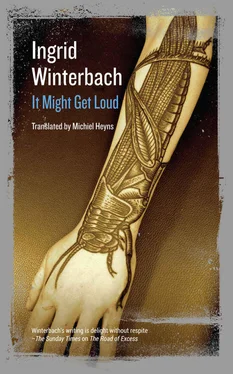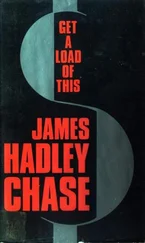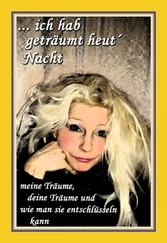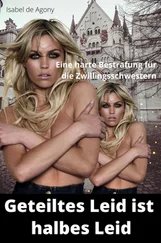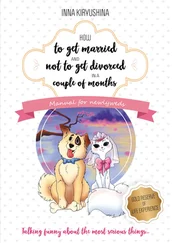The moon climbs higher. The second band is a rap group from Cape Town. Almost all the members are heavily tattooed and a few have Rasta hairstyles. One or two are wearing large snoods, another member has only a bush — a gigantic bush of hair, like Moses and the burning bush. One of the two lead rappers is a cocky little guy with a crazy haircut. Karl isn’t into rap, but he finds the group okay — quite amazing energy.
A girl has meanwhile come in on her own. He keeps an eye on her. She looks awkward. She is tall. Her long, thinnish blonde hair is tied back in a ponytail. She’s wearing capri pants and a turquoise blouse. Little sweat stains under the arms. Nice, long legs with strong, well-shaped calves. She’s wearing flip-flops. Later he ends up next to her at the bar. They start talking. She’s a teacher in the town. She has an open face (what you see is what you get?), her eyes are blue and without guile, she smiles all the time. Her eyeliner has been slightly crookedly applied, as if she did it in the dark. She has long, shy fingers. Silver nail lacquer on her fingers and toes. She looks like a good person. Uncomplicated and not overly critical or judgemental.
Two of the members of the hip-hop group are breakdancing in the middle of the room. A big circle has formed around them to cheer them on. The girl’s name is Elzette. Such a pretty, Afrikaans name. It’s getting a bit rough for her here, she says, doesn’t he want to come and have coffee in her flat?
Her flat is only a block from the main street. They sit at the kitchen table, on which there’s a bowl of green apples. All the surfaces are clean, the room is tidy. It reminds him of kitchens from his childhood. What’s wrong? she asks, she can see he’s very tense. He shrugs, job tension, he says. One of her subjects at college was physiotherapy, she says. Can she do his shoulders? At first he hesitates. She’ll be gentle, she says, she won’t hurt him. Okay then, he says, that’ll be nice. (Fortunately she doesn’t immediately produce a bottle of oil, he’d be embarrassed to say he doesn’t do oil.) He needn’t take off his shirt, she’ll do it just like that. (Just as well, his tattoos could scare her.)
While doing his shoulders she talks. She talks softly and gently. She tells of her fiancé, he also teaches. She tells of their cycling in the mountains every day, it’s so lovely there, she says, the surroundings are so lovely, they’re so blessed with natural beauty. The other day a yellow cobra slithered by in front of her, she got such a fright she almost fell off her bicycle. (Where must he go in a couple of days’ time with the raving Iggy?) She tells of the lovely sunrises, the sunsets. Lovely, she says. He could love her, this woman. Her eyes so without guile and her smile so sincere. Are his shoulders feeling better yet? she asks. Yes, very much better, he says. Lovely, she says. She tells of her parents, who also live in the town, she tells of her wedding plans. Throughout she talks softly and gently, soothingly. She is so tender-hearted it breaks his heart. Everything in her kitchen breaks his heart. Now he has to rush to the aid of the crazy Iggy, then he has to go somewhere with him, without a clue as to where, and all he really wants to do is sit in this kitchen listening to this woman’s soft, gentle voice and surrendering to her soft, firm touch.
*
Lucinda Hlobo, Jakobus Coetzee informs Maria Volschenk: something in that woman laid claim to something in him. From the start they could talk to each other. Perhaps her claim is based on her trade, perhaps on her personality, perhaps on her circumstances, perhaps on her appearance. She is a beautiful woman — tall, upright and dark. A Basotho he thinks.
Lucinda Hlobo has lovely posture, he says, regal. A girl for all seasons. He’s wanted for so long to invite her to his dwelling and play her a few songs on CD. A relationship has gradually grown up between them. She’s not somebody who offers up her secrets readily. She’s crafty, she’s street-wise, she’s sly. She weaves a cool web of intrigue and she sets her traps. She’s a trickster and a survivor. For her, too, and for her children, this place is a refuge. She is vigilant as a mother badger or wild dog over her whelps. They are alert, beady-eyed. Her eldest child, Zinzi, is five. Amos is three; on his pants is a squadron-leader label. Igor is eight, but he may not be part of the litter. Now she’s pregnant again. Nobody knows who the father is. Lucinda Hlobo is originally from Johannesburg. She’s told him, if you can survive in Johannesburg you can do it anywhere. In the meantime he’s also started to establish a relationship of trust with the children. He teaches them all sorts of arts and tricks. He teaches them ninja moves. He teaches them to carve things from wood. They spend a considerable amount of time with him, even in the boiling sun, in which he prefers to work, in the encampment that looks like a kraal. While their mother is plying her trade in motor cars, in toilets, in private homes, on the beach, on the mountain.
Here on the foster farm, Jakobus writes, now and again the light falls as it used to fall on a farm in his youth, and then for a while he feels taken care of.
There is a man here, says Jakobus, who says interesting things, but his suffering is great. His name is Ignatius. In a particular kind of light he also looks like some sort of outcast. Welcome to the realm of the disowned, the fabulous empire of the misfits. With Josias B standing guard over it all — director of operations and New Age Samaritan.
*
At this time Ignatius Hofmeyr takes to his room. For the time being he’s not venturing out again. The light is very bright outside. Sometimes it’s so sharp it almost blinds him. In his room is safest. Then he doesn’t have to listen to the honking of the geese (the souls of the dead) and the unchaste utterings of the swine (the cloven-hoofed — souls fallen into disfavour).
At this time when the crucial transformation is taking place, he must not be distracted by the world, and especially not by those who have for so long — months on end — harboured him ill-will. He thinks, he is convinced of it, that he is getting the upper hand. He thinks he’s succeeded in vanquishing them. God is on his side. God has helped him to vanquish his foes. It is the end of a long, drawn-out and indescribable agony.
*
It’s the end of March. It rains and it’s hot. Elsewhere in the country the weather is turning to autumn, but in this city it’s still like a greenhouse. Maria Volschenk takes a few days’ leave in order to immerse herself in the big natural history book — the visual guide to every living thing on earth. Devoutly she bows her head over the book — almost as if it were the Bible. She reads about the twenty-three main classes into which the invertebrates are divided and the five main classes of vertebrates. She suspects that all taxonomies are more or less arbitrary impositions of order; still, she is astounded at the prodigality that characterises the natural world, and also overwhelmed by the variety. Too much, too big, too comprehensive, she thinks. The task of a lifetime to explore it all, even just to take note of everything. And for the time being she’s restricting herself to the animal kingdom. The plant kingdom, the mosses, the ferns and flowering plants, these she hasn’t even touched, nor minerals and rocks, nor the miracles of microscopic life.
Gradually it dawns on her that it’s not enough merely to take cognisance of the twenty-three main groups of invertebrates (the crustaceans and coelenterata, sponges and insects; flatworms, roundworms, segmented worms, velvet worms and ribbon worms; arachnids, arthropods, brachiopods, gastropods and cephalopods; water bears, spider crabs, king crabs, tusk shells and chitons; molluscs, bivalves, cnidarians and Echinodermata), or of the five main groups of vertebrates (the fishes, amphibians, reptiles, birds and mammals).
Читать дальше
